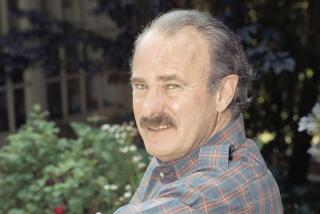Sounds of Popular Music Register Harshly Across a Generation Gap
I watched the Academy Awards a few weeks ago because I was inoculated with movies at a very young age and I have never been able to get them out of my blood. As a result, the Academy Awards ceremony--no matter how turgid and self-serving it becomes--is a tough habit for me to break.
If I ever do kick the habit, it will probably be because of the music. I like both Liza Minnelli and Dudley Moore, so I watched the segment of the show in which they introduced all five of the nominated songs. They were wise to do it in one burst; it would have been dreadful to scatter them through the show.
If you hung with it, you may recall the segment, but I will bet my original cast recording of “Oklahoma” that you can’t name the songs. Or even one of them. The only reason I know what they are is because I saved the program.
I am not sure if it was because of the way the songs were performed or just the normal atonality of today’s popular music, but I couldn’t detect a single melody in the whole bunch. I listened. I honestly tried to like them. After all, these songs were nominated by professional musicians as the best movie songs of the year. But I left the sequence feeling like a stranger in my own land. And also feeling that somehow the ghosts of other winners--the beautiful melodies of Rodgers and Kern and Berlin and Mancini and Hamlisch--had been somehow sullied.
I have a lot of trouble with modern pop music. I like to think that I move with change, that I recognize the new rhythms of each generation and try to understand if not to throw in with them. But music has turned out to be an almost impossible transition for me.
I have taken a few feeble steps. When my children were growing up and playing the hi-fi at ear-splitting levels, I was finally able to get through the cacophony to recognize and enjoy the genius of the Beatles. But that is as far as I ever got. Since then, I have had a tin ear for the changes in pop music.
There are exceptions, of course. Modern show music, exemplified by Stephen Sondheim and Andrew Lloyd Webber, I mostly like. Especially Sondheim. It is the Top 50 that does me in. There is such a gracelessness to this music that I wonder how its disciples are hearing it. Music was always soul food to me--and still is. Since I was very young, I have found sustenance in classical music, and I used to find it in popular music, too. But no more.
If pop music in indeed a reflection of our times, then I despair for the current generation. What I hear is mostly shrill, cynical, inarticulate and shapeless--without form or melody. The word grace sticks in my head. A beautiful word. We seem, today, to be a society without grace.
Admittedly, the pop music of my generation was outrageously romantic and maybe often sappy, but it had grace and style. And it had subtlety, which today’s music (with the exception of Sondheim) seems to lack completely. The lyrics of Lorenz Hart and Cole Porter, for example, were marvels of nuance, but the listener had to dig a little for it. Music was presented with a scalpel, not a shovel.
I am not sure whether music follows the prevailing social mores or leads them, although I suspect it is the former. If so, the evolution of popular music in this country almost charts the growth of a kind of national cynicism, which we have adopted as a defense mechanism against events that both frighten and bewilder us. So I can understand the direction our pop music has gone, but that doesn’t make it any easier for me to like it.
As a result, I have reverted more and more to records and tapes because it is increasingly difficult to find the music of my generation on the radio. I mean played neat and clean; I discount “supermarket” and “elevator” music that makes string-section mush of whatever it touches.
Used to be I could find my music on KMPC--if I could struggle through the myriad commercials and the folksy talk. But KMPC has switched to a hybrid sound now that I mostly don’t like. The change took place--according to Jackie Autry, whose husband, Gene, owns the station--because “we were losing a lot of listeners by playing the 1940s music exclusively.”
Well, maybe so. Maybe there aren’t enough of us to keep the ratings up and thereby attract the advertisers. I tried the mix on KMPC until last week when I heard a version of Jerome Kern’s lovely “Make Believe” that sucked every last bit of melody out of it in favor of one of those nasal, atonal vocal arrangements so popular today. That made me mad. They can do what they like with their own music, but I wish they wouldn’t mess around with mine.
More to Read
Only good movies
Get the Indie Focus newsletter, Mark Olsen's weekly guide to the world of cinema.
You may occasionally receive promotional content from the Los Angeles Times.






